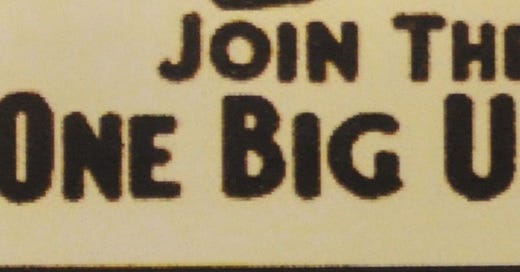This week’s announcement that the MLB Players Association has sent authorization cards to all minor leaguers, asking them to formally designate the MLBPA as their collective bargaining unit was a huge and welcome surprise. (Shout out to the Tipping Pitches podcast, which has dominated this beat for awhile.) Unionizing the minors is long overdue, and while there are still many steps between this and a CBA for the minor leagues, this a major milestone, and one that has been rightly celebrated.
For me, it makes me think of the Industrial Workers of the World. The I.W.W., or the Wobblies, as they were known for reasons nobody is quite sure of, is often dismissed as a group of star-eyed radicals who spent too much time plotting pointless violence, and not enough time actually organizing shops. It’s also easy to romanticize them, for similar reasons, as uncompromising idealists. But the idea behind the I.W.W.—that there ought to be one organization for all workers, regardless of industry or employer—is an important one on the step to class consciousness.
The only note of pushback against this attempt to unionize the minors is from people who don’t trust the MLBPA to represent the minor leagues. Major leaguers and minor leaguers, they point out, have different interests. So how can one union represent them both fairly?
But this kind of thinking is antithetical to organizing. The entire POINT of a union is to align the interests of people who could be pitted against one another if they were not organized together. In a non-union workplace, you might not have the same interests as your coworkers. After all, you and your coworkers are competing for hours, for promotions, for the boss’ attention, etc. And management will surely use that against you if they can. But by organizing together, you can bargain as a unit, which makes you stronger. In other words, the fact that major leaguers and minor leaguers might not always be aligned is a reason FOR organizing together, not a reason against it.
Of course, if you take this logic to its natural conclusion, you end up at the I.W.W.—the idea of One Big Union for all workers. It’s easy to dismiss such an impulse as naive, but the objections to it are mainly practical, not philosophical.
Anyway, here’s everything from Undrafted this month:
A piece on what Vin Scully and Bill Russell meant to their franchises, and how they illustrate what we mean when we talk about a “team”—and how that thing can’t really be privately owned. Honestly, not sure this piece totally came together…
As soon as I wrote this, Judge of course went into a “slump” where he didn’t homer for like eight games. I felt terrible about that. But anyway, he’s at 51 now, which is exactly as many as Maris had through as many games. So it should be a fun final month!
The title pretty much says it: Just let people take whatever ringworm medicine they want, my God… It’s so weird how we still talk about steroids like it’s 2002, even though pretty much everything people thought about steroids in 2002 has been disproven.
A central question of this newsletter is whether it is possible to have a healthy relationship with your job and still be elite at it. And both Sylvia Fowles and Serena Williams seem to pondering this question as they face their retirements.
What happens in a system when you individualize risk and privative gains? Well, you get a very wide gap between the rich and the poor. Julio Rodríguez is rich now, but I don’t think it’s a good system.



